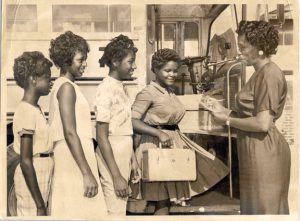Floy Britt is remembered as an advocate for African American youth during a time when the Florida Cooperative Extension Service was segregated. According to Joe Busby, dean for Extension at the time of Britt’s retirement in 1967, “Floy Britt was a pioneer in the civil rights movement to bring equal opportunities through 4-H clubs for black girls in Florida.”
 After graduating from Florida A&M University, Britt joined the Florida Cooperative Extension Service in 1932. She worked as a home demonstration agent in Hillsborough County, where she also supported African American 4-H clubs. A health educator by training, Britt helped establish urban gardens and taught food preservation to African American residents in Tampa, allowing them to produce and store extra food during the Great Depression.
After graduating from Florida A&M University, Britt joined the Florida Cooperative Extension Service in 1932. She worked as a home demonstration agent in Hillsborough County, where she also supported African American 4-H clubs. A health educator by training, Britt helped establish urban gardens and taught food preservation to African American residents in Tampa, allowing them to produce and store extra food during the Great Depression.
Britt went on to become a local district agent, supervising all African American home demonstration agents in Florida and establishing the Florida State Association for Negro Home Demonstration Agents, providing professional networking and guidance opportunities. In 1949, she was instrumental in creating Camp Doe Lake, a residential camp in the Ocala National Forest for African American 4-H youth. Britt earned a master’s degree in 1954 and was the first and only state director of 4-H for African American girls until 1965.
In 1981, the Black Archives at Florida A&M University created the Floy Britt Memorial Room to honor her legacy, and she is a Florida 4-H Hall of Fame inductee (2002).
About this Series: The year 2020 commemorates the centennial year of the passage of the 19th Amendment, a crucial achievement in the women’s suffrage movement. This milestone reminds us of the collective spirit marshalled to enact this change. Throughout the year, UF/IFAS is highlighting female researchers, educators, staff members, students and innovators who embodied a similar trailblazing spirit during their engagement with the university. These trailblazers left an indelible mark on both the university and the state of Florida. The 19th Amendment states, "The right of citizens of the United States to vote shall not be denied or abridged by the United States or by any State on account of sex,” although some women were still denied the right to vote until the passage of the Civil Rights Act of the 1960s. We hope this series inspires others to ignite their own trailblazing spirit and effect change in our world.
 0
0
